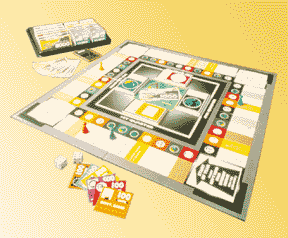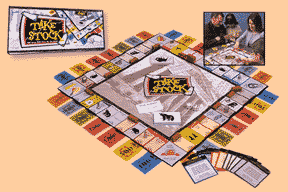
HOT TOPICS LIST
- Strategies
- Stocks
- Buy
- Investing
- Brokers
- Psychology
- Interviews
- Accumulate
- Sell
- Hold
- Spotlight
- Websites
- Candlestick Corner
- Gold & Metals
- Options Trading
LIST OF TOPICS
WHAT'S NEW
Games Investors Play
02/28/01 03:03:21 PM PSTby David Penn
Investing in stocks and mutual funds is serious business. But two companies have turned the rough-and-tumble world of stock trading and money management into two exciting (and educational) new board games, Mutual Mania and Take Stock.
| Ed, sales manager for Working Money, had had enough. He'd put all of his capital in Asia-Pacific mutual funds and, after a few rounds of losses with no gains, had figured out that he was through with Asia-Pacific mutual funds. "Here," he told the broker, handing over his purple fund certificates, "I'm selling. Take 'em all." Such a monumental trade might have raised a few eyebrows at the table had not Ed twice before decided he had had enough of Asia-Pacific mutual funds and cashed them all in -- only to buy back most of his old holdings a few turns later. The eyebrows did go up, however, when the game ended an hour later and Ed, with his strange-but-profitable strategy of "Asia-Pacific or bust," came in second place with a 28% return. Linda, credit manager for Working Money, was stunned -- as were the other players, WM staffers all, who'd gathered around a pair of heavy wood tables for a friendly after-work game of Mutual Mania in the back of the Elliott Bay Brewing Co., just across the street from the Technical Analysis, Inc., offices. After all, Linda -- like many of her cohorts -- had developed a strategy of building a diversified portfolio of bonds, US equities, and even utilities stock. She did well, finishing up with a 17% return (in fact, everyone who played the game that evening "made" money). But after Ed's surprising showing, it seemed as if the means to making money in Mutual Mania had proved to be almost as mysterious at the end of the game as at the beginning. It was almost enough to make the players wonder just what these financial board games were trying to teach us in the first place!
Mutual Mania is a board game in which players buy shares in mutual funds in an attempt to build (and keep!) their wealth. Whoever has the highest net worth in total cash and stock holdings at the end of the game wins, but to reach the end, players must guide their portfolios of stocks, bonds, and money market funds through oil discoveries, inflation spikes, and earnings reversals, as well as the everyday chaos and competition of the marketplace. To a degree, Mutual Mania resembles Monopoly in the way players travel around the board, buy assets (in this case, mutual funds), and respond to Chance-like cards that feature events that can have dramatic and unexpected consequences for players' portfolios.
Compared to Mutual Mania, with its changing stock prices and diverse array of mutual funds, Take Stock almost has no learning curve at all. But to talk with Deborah Wallace, who developed the Monopoly-like stock investing game with business partner D'Alene White, that's just about how she wants it. TRY 'EM OUT Both Mutual Mania and Take Stock are available at toy and game shops, as well as at Wizards of the Coast. Mutual Mania is also available through mutualmania.com, while Take Stock can also be purchased through wallaceandwhite.com. David Penn may be reached at DPenn@Traders.com. |
Technical Writer for Technical Analysis of STOCKS & COMMODITIES magazine, Working-Money.com, and Traders.com Advantage.
| Title: | Traders.com Technical Writer |
| Company: | Technical Analysis, Inc. |
| Address: | 4757 California Avenue SW |
| Seattle, WA 98116 | |
| Phone # for sales: | 206 938 0570 |
| Fax: | 206 938 1307 |
| Website: | www.traders.com |
| E-mail address: | DPenn@traders.com |
Traders' Resource Links | |
| Charting the Stock Market: The Wyckoff Method -- Books | |
| Working-Money.com -- Online Trading Services | |
| Traders.com Advantage -- Online Trading Services | |
| Technical Analysis of Stocks & Commodities -- Publications and Newsletters | |
| Working Money, at Working-Money.com -- Publications and Newsletters | |
| Traders.com Advantage -- Publications and Newsletters | |
| Professional Traders Starter Kit -- Software | |
PRINT THIS ARTICLE

Request Information From Our Sponsors
- StockCharts.com, Inc.
- Candle Patterns
- Candlestick Charting Explained
- Intermarket Technical Analysis
- John Murphy on Chart Analysis
- John Murphy's Chart Pattern Recognition
- John Murphy's Market Message
- MurphyExplainsMarketAnalysis-Intermarket Analysis
- MurphyExplainsMarketAnalysis-Visual Analysis
- StockCharts.com
- Technical Analysis of the Financial Markets
- The Visual Investor
- VectorVest, Inc.
- Executive Premier Workshop
- One-Day Options Course
- OptionsPro
- Retirement Income Workshop
- Sure-Fire Trading Systems (VectorVest, Inc.)
- Trading as a Business Workshop
- VectorVest 7 EOD
- VectorVest 7 RealTime/IntraDay
- VectorVest AutoTester
- VectorVest Educational Services
- VectorVest OnLine
- VectorVest Options Analyzer
- VectorVest ProGraphics v6.0
- VectorVest ProTrader 7
- VectorVest RealTime Derby Tool
- VectorVest Simulator
- VectorVest Variator
- VectorVest Watchdog

 MUTUAL MANIA
MUTUAL MANIA  TAKE STOCK
TAKE STOCK